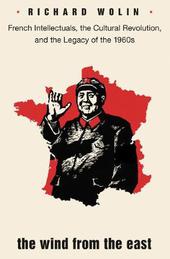
|
The Wind From the East: French Intellectuals, the Cultural Revolution, and the Legacy of the 1960s - Second Edition
Paperback / softback
Main Details
| Title |
The Wind From the East: French Intellectuals, the Cultural Revolution, and the Legacy of the 1960s - Second Edition
|
| Authors and Contributors |
By (author) Richard Wolin
|
|
Preface by Richard Wolin
|
| Physical Properties |
| Format:Paperback / softback | | Pages:464 | | Dimensions(mm): Height 235,Width 152 |
|
| Category/Genre | History of Western philosophy |
|---|
| ISBN/Barcode |
9780691178233
|
| Classifications | Dewey:944.0836 |
|---|
| Audience | | Tertiary Education (US: College) | | Professional & Vocational | |
|---|
| Edition |
2nd Revised edition
|
| Illustrations |
7 b/w illus.
|
|
Publishing Details |
| Publisher |
Princeton University Press
|
| Imprint |
Princeton University Press
|
| Publication Date |
14 November 2017 |
| Publication Country |
United States
|
Description
Michel Foucault, Jean-Paul Sartre, Julia Kristeva, Phillipe Sollers, and Jean-Luc Godard. During the 1960s, a who's who of French thinkers, writers, and artists, spurred by China's Cultural Revolution, were seized with a fascination for Maoism. Combining a merciless expose of left-wing political folly and cross-cultural misunderstanding with a spir
Author Biography
Richard Wolin is Distinguished Professor of History, Comparative Literature, and Political Science at the City University of New York Graduate Center. His books, which include Heidegger's Children and The Seduction of Unreason (both Princeton), have been translated into ten languages. His articles and reviews have appeared in Dissent, the Nation, and the New Republic.
Reviews"The Wind From the East must be regarded as a monument of committed scholarship. It is also a fascinating chronicle of people who, however ludicrous they may seem at times, did on occasion think and act with profound seriousness. For that reason the book is a valuable addition to the literature of the era."--David Gress, Wall Street Journal "Wolin surveys a wide range of French intellectuals' responses to Mao's China. The best of these responses creatively appropriate the concept of cultural revolution, leading to a new libertarianism and to the embrace of causes such as gay rights, women's liberation, and prison reform; the worst of them became fatally compromised by a blind endorsement of the crimes of Chinese communism... Wolin skewers irresponsible intellectual posturing in a manner reminiscent of the late Tony Judt, but reveals an underlying sympathy with the goals and ideals, if not always with the choices, of the Gauchistes. A masterful performance."--Choice "Even as he is documenting the delusions of the sixty-eighters--often with considerable wit, and with a seemingly encyclopedic familiarity--Wolin grants credence to their skewed perception of the status quo in France and in the West more generally. Disagreements and exasperations aside, I found this book compulsively readable. The history of Sixties is a long way from being exhausted."--John Wilson, Books & Culture "[A] fascinating and dispassionate account of one of the more curious follies of recent times."--Jeremy Jennings, Standpoint "Wolin argues that fascination with the Great Proletarian Cultural Revolution reflected, not simply a taste for exoticism, but a delayed response to postwar capitalist modernisation."--Scott McLemee, The National "Richard Wolin has provided us with an informative and readable account of a fascinating episode in twentieth-century French intellectual history, knowledgeably placing it into its wider biographical and political contexts."--Moritz Follmer, French History "The Wind from the East tells the story of the '68 generation with a much needed awareness of the complexities of its intellectual odyssey. It is, in the end, a meditation of considerable depth on the formation of political judgments. As such, it is an important book, both within the field of French history and beyond."--Michael C. Behrent, H-France Review "The Wind from the East will be a rewarding and exciting reading for all those with an interest in French studies, politics, and intellectual history."--Viola Brisolin, European Legacy
|